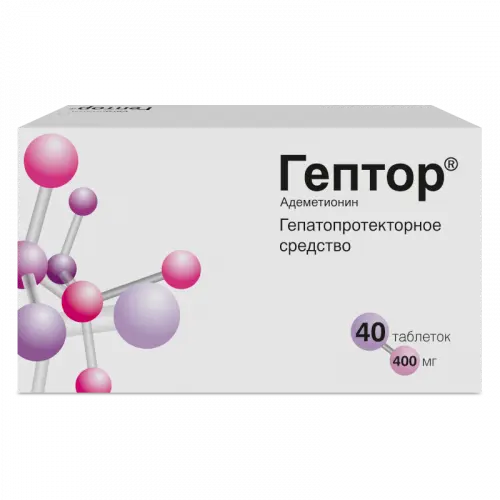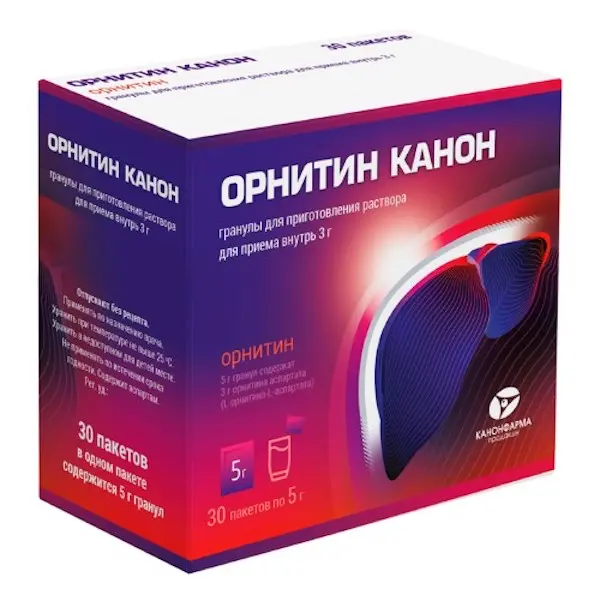Description
Heptor Pharmacodynamics
Ademetionine belongs to the group of hepatoprotectors, also has antidepressant activity. It has choleretic and cholekinetic effect, has detoxifying, regenerating, antioxidant, antifibrotic and neuroprotective properties.
It replenishes the deficiency of S-adenosyl-L-methionine (ademetionine) and stimulates its production in the body, contained in all body media. The highest concentration of ademetionine is found in the liver and brain. It plays a key role in the metabolic processes of the body, and takes part in important biochemical reactions: transmethylation, transsulfurization and transamination. In transmethylation reactions, ademetionine donates a methyl group for the synthesis of cell membrane phospholipids, neurotransmitters, nucleic acids, proteins, hormones, etc. In transsulfurization reactions ademetionine is a precursor of cysteine, taurine, glutathione (provides redox mechanism of cellular detoxification), coenzyme A (is included in biochemical reactions of tricarboxylic acid cycle and replenishes cell energy potential). Increases glutamine content in the liver, cysteine and taurine in plasma; decreases methionine content in serum, normalizing metabolic reactions in the liver. After decarboxylation it participates in aminopropylation reactions, as precursor of polyamines – putrescine (stimulator of cell regeneration and hepatocyte proliferation), spermidine and spermine, which are part of the ribosome structure, which reduces the risk of fibrosis. It has a choleretic effect. Ademetionine normalizes the synthesis of endogenous phosphatidylcholine in hepatocytes, which increases membrane fluidity and polarization. This improves the function of bile acid transport systems associated with hepatocyte membranes and promotes the passage of bile acids into the biliary tract. It is effective in intradolocular variant of cholestasis (impaired bile synthesis and flow). Ademetionine reduces toxicity of bile acids in hepatocyte by performing their conjugation and sulfation. Conjugation with taurine increases solubility of bile acids and their excretion from the hepatocyte. The process of sulfation of bile acids promotes the possibility of their elimination by the kidneys, facilitates the passage through the hepatocyte membrane and excretion with bile. In addition, sulfated bile acids themselves additionally protect liver cell membranes from toxic effects of nonsulfated bile acids (in high concentrations present in hepatocytes with intrahepatic cholestasis). In patients with diffuse liver diseases (cirrhosis, hepatitis) with intrahepatic cholestasis syndrome, ademetionine reduces the severity of skin itching and changes in biochemical parameters, including direct bilirubin concentration, alkaline phosphatase activity, aminotransferases and others. Choleretic and hepatoprotective effect persists up to
3 months after discontinuation of treatment. It is shown to be effective in hepatopathies caused by various hepatotoxic drugs. Antidepressant activity appears gradually starting from the end of the 1st week of treatment and stabilizes within 2 weeks of treatment.
Indications
Intrahepatic cholestasis in precirrhotic and cirrhotic conditions, which can be seen in the following diseases:
– fatty liver dystrophy
– chronic hepatitis
– toxic liver lesions of various etiologies, including alcoholic, viral, medicinal (antibiotics, antitumor, anti-tuberculosis and antiviral drugs, tricyclic antidepressants, oral contraceptives)
– Chronic non-calculous (acalculous) cholecystitis
– cholangitis
– liver cirrhosis
– Encephalopathy, including that associated with liver failure (alcoholic, etc.).
Intrahepatic cholestasis in pregnant women.
Symptoms of depression.
Contraindications
– Genetic disorders that affect the methionine cycle and/or cause homocystinuria and/or hyperhomocysteinemia (cystathion beta synthase deficiency, vitamin B12 (cyanocobalamin) metabolism disorders)
– Hypersensitivity to any of the drug components
– under 18 years of age (experience of medical use in children is limited)
– bipolar disorders
Caution
Pregnancy (I trimester) and breast-feeding (application is possible only if the potential benefit to the mother outweighs the possible risk to the fetus or child).
Concomitant use with selective serotonin reuptake inhibitors (SSRIs), tricyclic antidepressants (such as clomipramine), and herbal and tryptophan preparations (see section “Interaction with other medicinal products”).
Older age.
Renal insufficiency.
Usage during pregnancy and during breastfeeding.
It has been shown in clinical studies that the use of ademetionine in
III trimester of pregnancy did not cause any undesirable effects. Heptor® administration in pregnant women during the first trimester and during breastfeeding is possible only if the potential benefit to the mother exceeds the possible risk to the fetus or child.
How to use and dosages.
- Inside.
- Tablets should be taken in whole without chewing, preferably in the morning between meals.
- Take Heptor® tablets out of blister immediately before taking them orally.
- Initial therapy:
The recommended dose is 10-25 mg/kg/day. - Intrahepatic cholestasis
The dose ranges from 800 mg/day to 1600 mg/day. - Depression
The dose is from 800 mg/day to 1600 mg/day. - Duration of therapy is determined by the physician.
- Heptor® therapy may be started from intravenous or intramuscular injection followed by administration of Heptor® tablets or directly from using Heptor® tablets.
- Elderly patients
Clinical experience with Heptor® has not shown any difference in efficacy between elderly patients and younger patients. However, taking into account high possibility of existing hepatic, renal or cardiac dysfunction, other concomitant pathology or concomitant therapy with other drugs, the dosage of Heptor® must be chosen with caution in elderly patients, starting from the lowest dose range. - Renal failure
Limited clinical data are available about Heptor® administration in patients with renal failure, therefore, caution is recommended when using Heptor® in these patients. - Liver failure
Parameters of ademetionine pharmacokinetics are similar in healthy volunteers and in patients with chronic liver disease. - Children
Administration of Heptor® in children is contraindicated (efficacy and safety have not been established).





